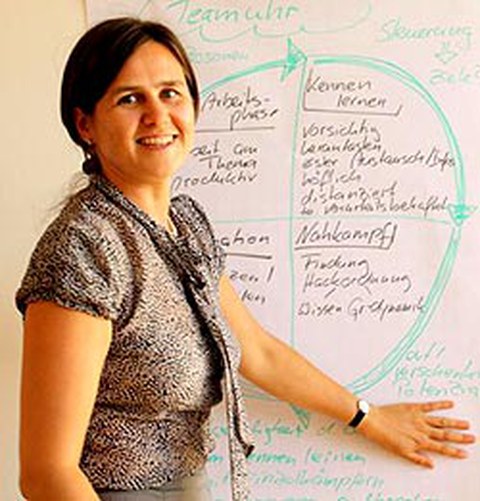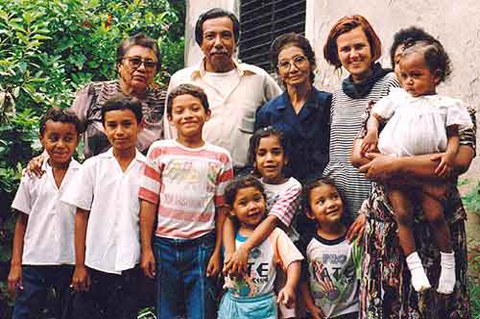Building bridges
(Interview from 2011)
Dagmar Möbius
After training as an educator, Anja Centeno García went on to manage a project for street children in Nicaragua. She fulfilled her dream of going to university while working in a group home for young people. The linguist and cultural studies graduate now works as a freelance lecturer and communications coach for a number of organizations. Including TU Dresden.

Anja Centeno García
It was for personal reasons that the Dresden native moved to Herford in 1990 at the age of 18. Her career choice, on the other hand, was purely logical: "Education is right up my alley." She graduated from the Anna-Siemsen-Berufskolleg vocational school and trained as a state-recognized educator. Why an educator? "I wanted to be independent of my parents, and the only feasible alternative would have been recreational sports – which wasn't my thing," laughs the 39-year-old. Over four years, she trained in all aspects of care and education from daycare to children's homes.
Youth exchange trips during her training were an early opportunity to meet people from Condega in Nicaragua, which is twinned with Herford. "I was determined to go to the country for longer than six weeks," says Anja Centeno García, looking back. She applied for financial support from the Carl-Duisberg-Gesellschaft society, which helped her to fund her first few months in Nicaragua. For two and a half years, until 1997, she worked as an educator and coordinator with the INPRHU project for street children in Condega. "The small center teaches children skilled manual work in candle-making and tailoring workshops, for example," she says. Literacy classes were also offered. Work on the streets and continuing education programs for teachers on various topics were part of Anja Centeno García's job, as was the coordination of international solidarity projects. She could already speak Spanish before she went to Nicaragua. Now, she is fluent.
Her most important experience in the Latin American country was a personal one: the birth of her daughter. "An event like that is approached in a much more matter-of-fact way than here in Germany." In general, she was impressed by the energy and pragmatism of the women; the way they tackle problems. Although she does add, "I don't know whether that culture of doing, of managing, is still prevalent there today." The linguist and cultural expert describes her own return to Germany as turbulent. She might have stayed longer in Nicaragua had health reasons not forced her to leave her post. Back in Dresden, she worked as an educator in a group home run by Diakonisches Werk. "I had always planned to study," she explains, "but those plans became more concrete after I had worked as an educator for a while."
Anja Centeno García initially enrolled at FernUniversität in Hagen for a distance-learning course in economics, education, and literature. "A pretty crazy combination," she grins. After two semesters, however, she realized that she was more of a face-to-face learning person. She switched to TU Dresden, where she studied German as a Foreign Language and Romance Studies from 2000 to 2005. "Studying on campus was a logistical challenge" for a woman who was at that point a single mother. However, she learned that "you can get a lot done with good time management." Irregular working hours ensured enough flexibility that she was able to set aside two days for study each week. It was the intercultural aspect of classes that had the greatest impact on her, and she still finds that it provided a solid foundation for her work today.
She is grateful to her professors Dagmar Blei, Maria Lieber, and Norbert Rehrmann (†). "Dagmar Blei was strongly committed to promoting young talent, Maria Lieber found creative solutions to make teaching interesting and interdisciplinary, and Norbert Rehrmann promoted and inspired interdisciplinary thinking."

Anja Centeno García with her host family in Condega
While still a student, Anja Centeno García worked as a tutor in the Department of German as a Foreign Language at TU Dresden and at the Institute of Romance Studies. She was a language teacher for the Boston University Dresden Program and, in 2006, had a teaching post at the Institute of Romance Studies at TU Dresden. From 2006 to 2008, she worked as a research assistant at the Chair of Cultural Studies: Spain/Latin America on the question of what constitutes professionalism in cultural studies. Her thesis explores the quality of texts from a linguistic standpoint. This doctoral project is another challenge, as she "has never done exclusively research." Its completion is nonetheless currently her top priority.
Since 2009, Anja Centeno García has worked primarily as a freelance lecturer and (communications) coach. She previously taught communication, German, and project management at SRH Hotel-Akademie (Dresden School of Management), but left the part-time post as her freelance workload increased. However, that connection to the hotel industry remains important to her: She works with both a number of small hotels and BA Sachsen University of Cooperative Education. "The combination of teaching and practice is exciting," she says. In her view, that is something that is sometimes lacking at traditional universities. At the TU Dresden Center for Continuing Education, she teaches a wide range of courses in the university teacher training program "Fit für die Lehre".
Anja Centeno García is of the firm conviction that art and language studies – often dismissed as purely academic pursuits – can be a valuable practical skill on the job market. She considers strong expertise, analytical and systematic thinking, the ability to change perspective, and critical analysis skills to be essential to her work as a consultant, in which she has to be able to get to grips with new areas. In short, the skills you need in order to know what you're doing.
"I understand didactics as a bridge between the logic of the subject and the psychology of the learner. It is my job to help build that bridge," she explains.
Humanities students need to think about how they can apply their knowledge in industry, and general theories to practice. As there is no clear job profile for arts and language graduates, she recommends reading job adverts in a way that allows you to use and "sell" your skills. "If you can do it, it will work out well."
Contact details:
Anja Centeno García M.A.
Language and cultural studies expert
Consultancy/Coaching/Training
Tel./Fax: +49 351 3225792
Email: Anja Centeno García
